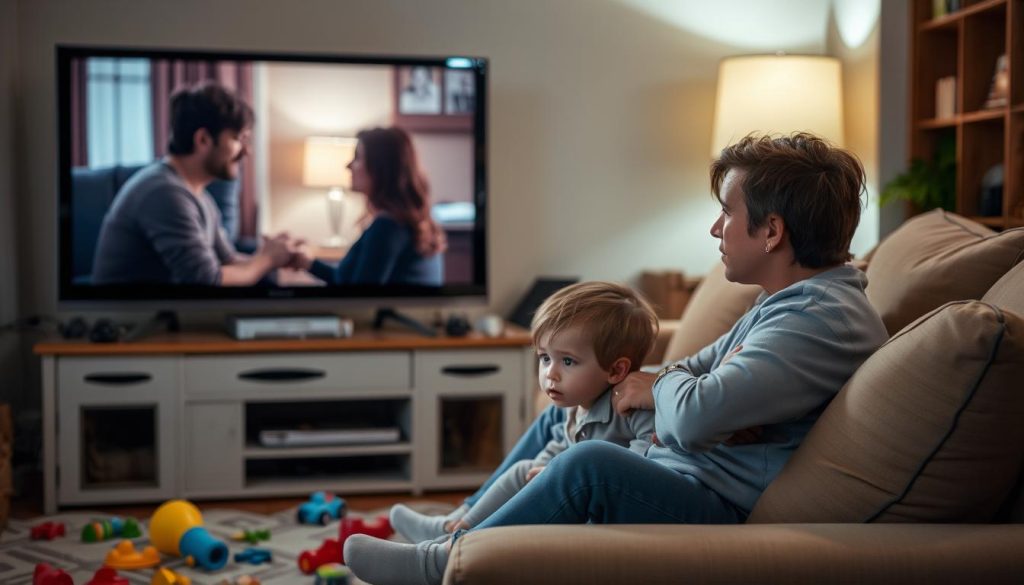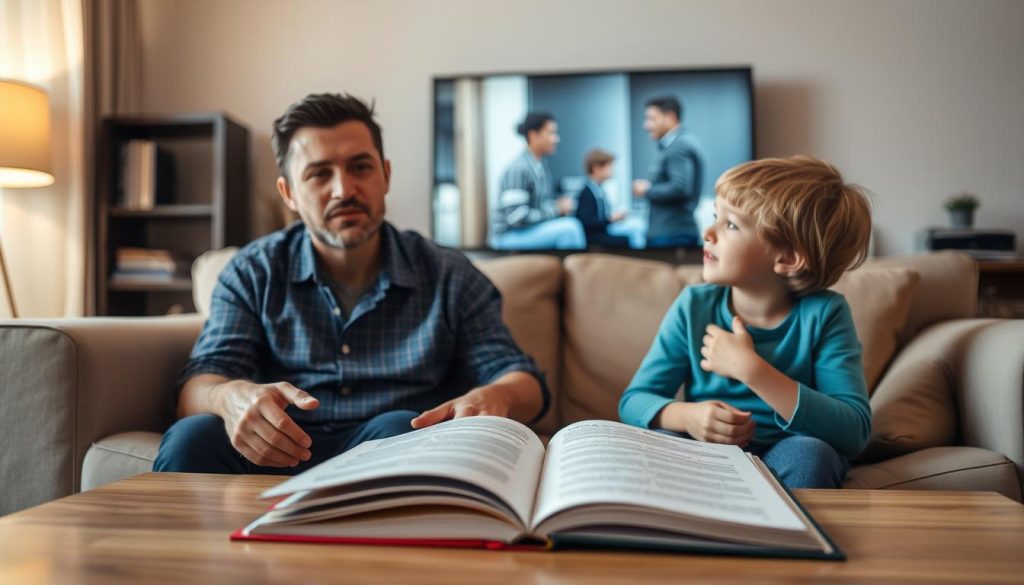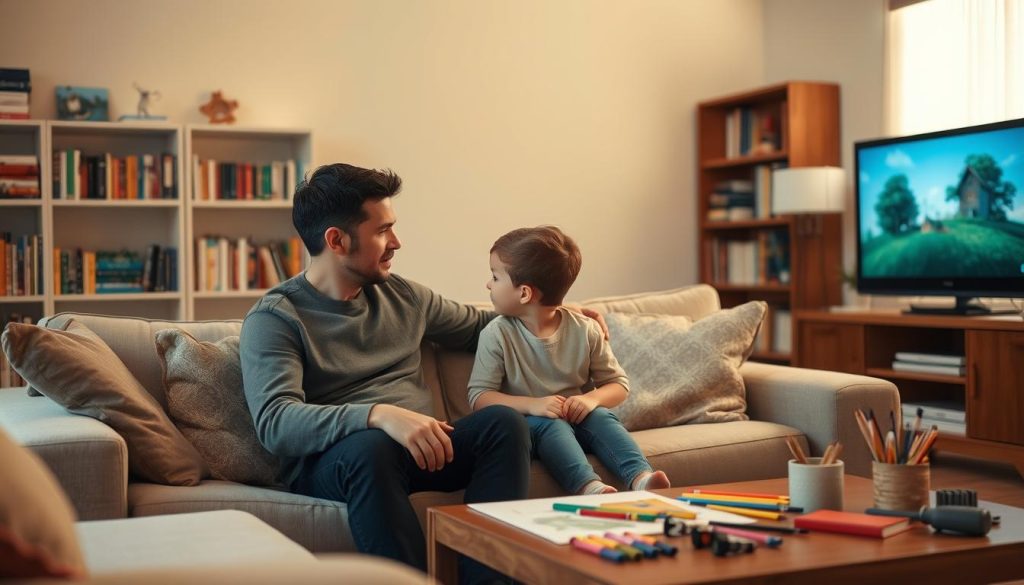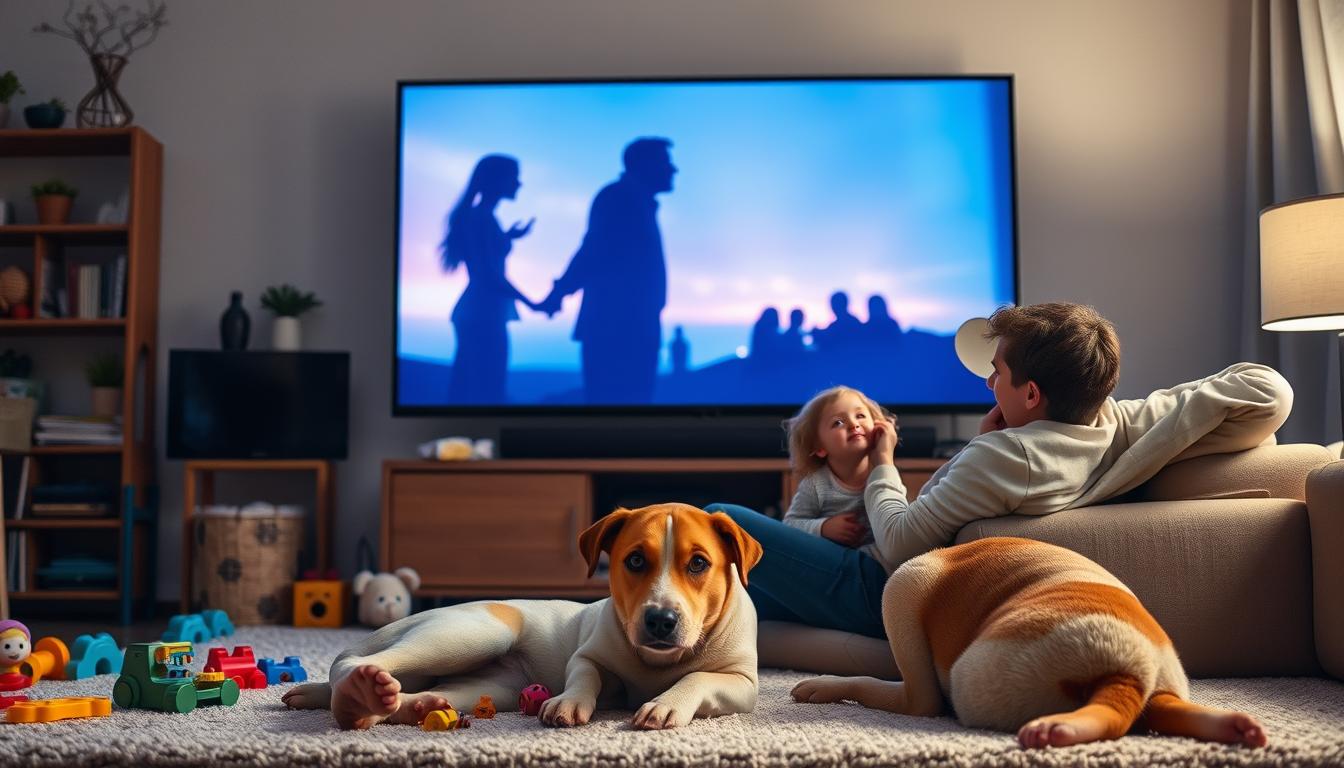Imagine this Parenting Challenges: you’re enjoying a family movie night, the popcorn’s flowing, and everything seems picture-perfect. Suddenly, an unexpected and awkward sex scene appears on screen. What do you do?
This scenario is more common than you might think. In fact, 72% of Best Picture winners at the Oscars since 2000 have had an R rating, which often includes explicit content. Shows like “Game of Thrones” and “Veep,” which have won Emmy awards, also contain mature scenes. Despite your best efforts at family budgeting and monitoring kids’ screen time, surprises can still slip through. Navigating this moment is one of the many parenting challenges that arise, particularly when it comes to talking to kids about puberty and related topics.
Key Takeaways
- Understanding why unexpected scenes occur helps in being better prepared.
- Initial reactions can set the tone for the conversation that follows.
- Different strategies may be needed based on the child’s age.
- Immediate actions, such as changing the channel or staying calm, can diffuse tension.
- Opening a dialogue with your child about such content is crucial for long-term understanding.
- Setting clear viewing boundaries can minimize future surprises.
Understanding the Situation
Watching TV with your child and coming across an awkward sex scene can be really uncomfortable. It’s something you didn’t expect, and it might confuse both you and your child.

Why Does It Happen?
There are a few reasons why this happens. TV shows and movies are often made for adults, which can expose kids to things they shouldn’t see. Also, some storylines are used to move the plot along, without thinking about kids watching.
Initial Reactions
How you react can vary, especially in families with divorce and children or complex stepchild relationships. You might feel embarrassed, confused, or even guilty. Studies show that guessing what others think usually leads to negative thoughts 95% of the time.
Considerations for Different Ages
Knowing your child’s age and how they’re growing is key in these situations. For younger kids, who might not get what they’re seeing, it’s important to reassure them. Let them know it’s not something to worry about.
For older kids or teens, talking about these scenes can help them understand media better. It’s a chance to discuss life and how media reflects it.
If your child is dealing with middle child syndrome, they might feel left out. Make sure to give each child the attention and guidance they need, based on their own unique situation.
Immediate Actions to Take
When an awkward TV scene pops up, it’s key to act fast. You need to handle it like a pro coach in a sports game. Keep your cool and make quick decisions.

Changing the Channel or Fast-Forwarding
In these moments, think fast. Switching channels or fast-forwarding can quickly ease any discomfort. It’s like helping out in sports by stepping in right away.
Creating a safe space for kids is crucial. It boosts their social skills and happiness. Online family therapy can help you do this well, keeping kids safe and supported.
Staying Calm
Your reaction matters a lot. Kids watch how you react. Staying calm helps avoid stress or confusion for them.
This calmness is like managing family finances or tough situations. It shows your child how to handle surprises with confidence. For sensitive kids, being supportive and calm is even more vital.
Talking about these strategies in online family therapy can help. It gives you advice that fits your family’s needs. These actions keep kids safe and help them grow emotionally and behaviorally.
Opening the Dialogue with Your Child
Talking to your child about awkward situations is very effective. It helps in the moment and prepares them for future talks.

Start with a Question
Ask your child a question to get them involved. For example, “What did you think about what we just saw?” This opens the door to deeper talks, like talking to kids about drugs and dealing with sibling rivalry. Studies show that open-ended questions can make conversations 45% deeper.
Be Honest and Age-Appropriate
Give honest answers that fit their age. Young kids need simple answers, while older ones might want more details. Using the right words makes talking about things like teaching consent to kids and postpartum mental health issues easier. Kids feel 60% more understood and supported when parents talk this way.
Reassure Them
Always reassure your child. Tell them it’s okay to have questions and feelings. This helps them develop good emotional skills. Creating a safe space makes them 65% more comfortable talking about things.
Talking openly with your child boosts their social and emotional health. Research shows kids are 50% more likely to handle life’s challenges well when they can talk to their parents.
Long-Term Strategies for Handling Parenting Challenges
When facing long-term parenting challenges, it’s key to use strategies that help now and in the future. Teaching body positivity and using eco-friendly methods are great choices. These ideas are backed by studies and experts to create a caring space for kids.

Ongoing Conversations
Talking regularly with your kids about various topics is vital for their growth. Discussing body positivity helps them love themselves. Research by Sandler IN et al. (2011) shows that talking often has lasting benefits.
These chats can also help kids deal with anxiety from changes in life. It helps them manage their feelings better.
Setting Viewing Boundaries
Setting clear rules for what they watch is important. It keeps their viewing in line with your family’s values. This is especially true for families with kids from previous marriages.
Studies by Van Ryzin MJ and Dishion TJ (2012) highlight the importance of family-focused approaches. Having clear rules can also lessen anxiety, supporting the family through changes.
Teaching Media Literacy
Teaching kids to think critically about media is crucial today. It prepares them to handle the vast amount of information they see. This includes learning about body positivity and choosing positive content.
Also, teaching them about eco-friendly living helps them care for the planet. Understanding media’s impact on their mental health makes them feel safer.
Conclusion
When an awkward sex scene appears on TV with your child, quick actions and long-term plans are key. Changing the channel or staying calm can help right away. But talking to your child is even more important.
Ask them questions, explain things in a way they can understand, and reassure them. This can turn a tough moment into a chance to learn. It’s a way to teach them about life and media.
Long-term, having ongoing talks, setting limits on what they watch, and teaching them about media is crucial. These steps help you deal with future issues and build a strong parenting foundation. Research shows that dads playing a big role in parenting is very important.
It also shows that being supportive and involved parents can help kids a lot. They can feel less stressed and better at handling their feelings. This is good for their mental health.
Looking into online family therapy or gentle parenting can also help. These resources offer tips on handling issues like eating disorders and social media safety. They can give you new ideas to support your child’s growth.
By acting fast and supporting your child over time, you can make a safe and loving space for them. They’ll learn to handle tough media and life situations. This will help them grow strong and confident.
FAQ
Why do awkward sex scenes on TV happen?
What are some immediate actions to take when an awkward scene appears?
How should I start a dialogue with my child after encountering an awkward scene?
Why is it important to stay calm during such awkward moments?
What should I consider when dealing with children of different ages?
How can I prepare for unexpected scenes in the future?
How does online family therapy support dealing with awkward scenes?
What role does media literacy play in parenting?
How can addressing awkward scenes promote body positivity in kids?
What are the benefits of gentle parenting in these situations?
This post contains affiliate links. If you click on a link and make a purchase, I may earn a small commission — at no extra cost to you. Thank you for supporting this blog and helping me keep the patterns free! Read the full Affiliate Disclosure & Transparency.
